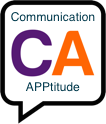We've all relished in seeing our students have that aha! moment. I thrive on it and beam when it happens. In Denver last week, I had my own aha! moment. I was in the Practical Strategies for Middle School and High School students class with hundreds of other SLPS (in the overflow room) and something Stephen Charlton said made the lightbulb illuminate.
SLPs are not responsible for getting the student a good grade on the next test. They are responsible for giving students the strategies so later in the school year they are getting good grades, because they can.That message was freeing. As a speech language pathologist in private practice, I feel so much pressure to help my students ace that next test by learning the vocabulary, developing mnemonics to recall information and comprehending the textbook passages. It's a reminder that my job is to give my students strategies to learn new vocabulary effectively. I need to teach them how to attack expository text by paying attention to the key words in the passages. The student and I work together to find what strategies work for them in all areas of academics and then hone those skills so they can master the material independently, eventually.
I'm disowning the guilt trip I feel when students don't do as well as I would hope. I'm taking on the role of language expert and cheerleader, all wrapped in one. Still relishing in those aha! moments, but looking more for the light at the end of the tunnel when they master a language skill that leads to accomplishment and success. - Deena Seifert, M.S.,CCC-SLP


